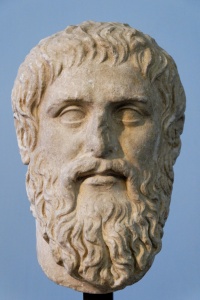Plato
From Geography
(→Literature) |
(→Author) |
||
| (7 intermediate revisions not shown) | |||
| Line 1: | Line 1: | ||
| - | Plato (429-347 BC) was one of the great philosophers that lived in ancient Greece. He was the founder of the first institution for higher education (the Academy) | + | |
| + | [[File:plato.jpg|200px|thumb|right|Plato © Marie-Lan Nguyen / Wikimedia Commons]] | ||
| + | |||
| + | Plato (429-347 BC) was one of the great philosophers that lived in ancient Greece. He was the founder of the first institution for higher education (the Academy). His mentor was another great Greek philosopher Socrates and Aristotle was his student (Kraut, 2012). Although Plato did a lot of writing and thinking on numerous subjects we will focus on his notions about space in this entry. We do this because this wiki is aimed at geography and in this disciple we use the word and concept a lot, it is therefore useful to have a basic understanding and historical view of it. | ||
== Space == | == Space == | ||
| Line 10: | Line 13: | ||
== Literature == | == Literature == | ||
| - | Kraut, R. (2012, Summer). ''Plato''. | + | Kraut, R. (2012, Summer). ''Plato''. Retrieved on 3 13, 2013, From Stanford Encyclopedia of Philosophy: http://plato.stanford.edu/entries/plato/ |
School voor Filosofie. (2011). ''Platoon verzameld werk: Plato Timaios''. Amsterdam, Netherlands: Stichting Ars Floreat. | School voor Filosofie. (2011). ''Platoon verzameld werk: Plato Timaios''. Amsterdam, Netherlands: Stichting Ars Floreat. | ||
| Line 17: | Line 20: | ||
--[[User:MarnixAarntzen|MarnixAarntzen]] 15:26, 14 March 2013 (CET) | --[[User:MarnixAarntzen|MarnixAarntzen]] 15:26, 14 March 2013 (CET) | ||
| + | |||
| + | Added picture --[[User:MarnixAarntzen|MarnixAarntzen]] 15:39, 14 March 2013 (CET) | ||
Latest revision as of 14:51, 14 March 2013
Plato (429-347 BC) was one of the great philosophers that lived in ancient Greece. He was the founder of the first institution for higher education (the Academy). His mentor was another great Greek philosopher Socrates and Aristotle was his student (Kraut, 2012). Although Plato did a lot of writing and thinking on numerous subjects we will focus on his notions about space in this entry. We do this because this wiki is aimed at geography and in this disciple we use the word and concept a lot, it is therefore useful to have a basic understanding and historical view of it.
Space
In his work Timaios (for this entry a Dutch translation with commentary has been used) the philosopher makes a distinction between Being, Motion and Space (School voor Filosofie, 2011). He goes on making a distinction between space and matter. Claiming that space is a distinct characteristic of matter he argues that without matter there is no space. Empty space therefore is a concept that cannot be achieved and only exists as a idea in our heads. In his argument he speaks about the fact that we can only dream about empty space and (what he calls) primal substance, but when we wake up this is all gone. The awaken state does not enable us to clearly see the truth regarding these concepts; we need this dream-state to have the clear view about them.
Furthermore Plato says that the spatial characteristic has influence on the actual object or matter of which it is the characteristic, it is here that the other two pillars of his reasoning come into play (Being and Motion).
Literature
Kraut, R. (2012, Summer). Plato. Retrieved on 3 13, 2013, From Stanford Encyclopedia of Philosophy: http://plato.stanford.edu/entries/plato/
School voor Filosofie. (2011). Platoon verzameld werk: Plato Timaios. Amsterdam, Netherlands: Stichting Ars Floreat.
Author
--MarnixAarntzen 15:26, 14 March 2013 (CET)
Added picture --MarnixAarntzen 15:39, 14 March 2013 (CET)
